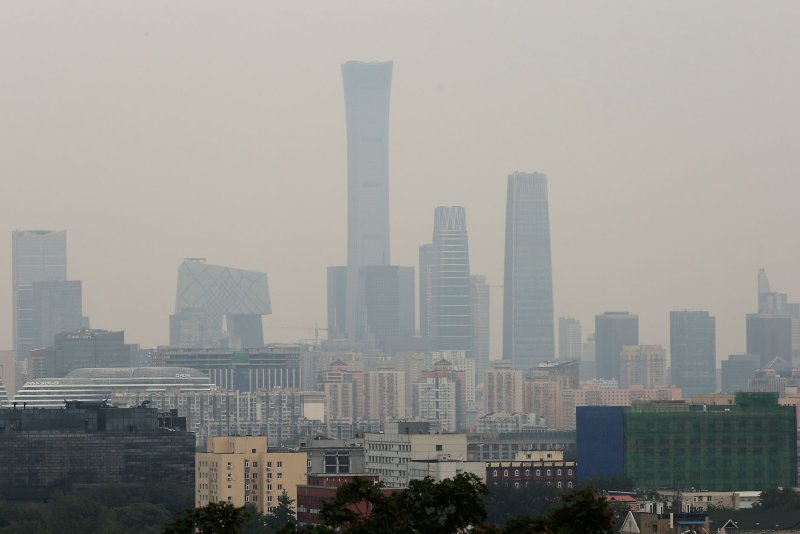A heavy haze hangs over Beijing on September 13. A new index from the Global Green Growth Institute found that most countries were not on track to meet sustainability goals. File Photo by Stephen Shaver/UPI |
License Photo
SEOUL, Oct. 23 (UPI) -- A new index that measures "green growth" performance -- a term for environmentally sustainable economic development -- in 115 countries was released on Wednesday, and found that fewer than a quarter were close to reaching international targets.
The index was unveiled by the Seoul-based Global Green Growth Institute, an inter-governmental organization that promotes sustainable growth in developing countries and emerging economies, during its annual Global Green Growth Week conference.
Countries all over the world urgently need to adopt sustainable growth policies "if they are to avoid climate emergency in the next 10 years," Orestes Anastasia, head of GGGI's thought leadership department, told UPI. "They need to rethink their economies, and green growth frameworks offer that opportunity."
A 2018 report from the United Nations' Intergovernmental Panel on Climate Change concluded that by 2030, greenhouse gas emissions would need to be slashed by 45 percent from 2010 levels in order to limit warming to a 1.5-degrees Celsius increase.
The top-performing countries on the new index were concentrated in Europe. Denmark ranked highest overall, with a score of 75.32 out of a possible 100 points, with Sweden next at 75.09. Austria, Finland, the Czech Republic, Italy and Germany were the only remaining countries scoring 70 or above.
The country scores were benchmarked to international agreements such as the United Nations Sustainable Development Goals and the Paris Agreement on Climate across categories of resource use, social inclusion, natural capital protection and green economic opportunities. A perfect 100 would mean all sustainability goals had been met.
Singapore was the highest-ranking country in Asia, with a score of 58.43, while the Dominican Republic topped the Americas with a score of 55.10 and the United States followed with a 54.22 .
The overall score helps countries compare themselves to their neighbors, said Jose Pineda, adjunct professor at the Sauder School of Business at the University of British Columbia and a contributor to the GGGI index. But it is the underlying data from each category that can help drive policy decisions.
"If you really want to change things within the country, you have to look at each indicator and see the areas where you're lagging the most," he told UPI. "That fine-tuning is what will be most useful for the countries."
GGGI Chairman and President Ban Ki-moon, former United Nations Secretary-General, called on the international community to transform the world's fossil fuel-based economy in a pre-recorded video that kicked off the conference on Monday.
"We -- the international community -- need to adopt resolute measures to transform our fossil fuel-based energy systems," he said. "Worldwide, governments need to adopt bolder national strategies and more ambitious targets for renewable energy adoption."
Ban added that the transition to a greener economy offers new opportunities for developing nations to take major steps forward economically and socially.
"For developing countries in particular, the green energy transformation can play the role of a bridge to modernization, economic growth and greater social inclusiveness," he said.
With falling costs of renewable energy, transforming to a greener economy can save money as well, Frank Rijsberman, GGGI's director-general said in a statement, making it a "win-win for countries and businesses."
"The position that renewable energy is more expensive than fossil fuels is no longer credible, with many of our member countries discovering that renewables are not only the more environmentally conscious alternative but the cheaper option as well," he said.
The authors of the new index stressed that it is evolving and sufficient data is lacking in a number of areas, allowing them to include only 115 out of a total of 207 countries surveyed.
"This is not the final word," Rijsberman said in remarks introducing the index. "This is the first version of what we think can be a good tool. We will keep working on it and we will improve it."















